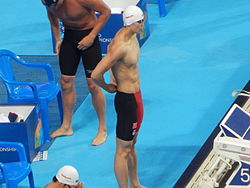2022 Asian Games opening ceremony
The 2022 Asian Games opening ceremony was held on 23 September 2023, at the Hangzhou Sports Park Stadium in Hangzhou, Zhejiang, China. The ceremony began at 8:00 PM China Standard Time (UTC+8) and finished at 10:15 PM local time, lasting two hours.[1] BackgroundThe 2022 Asian Games ceremony was choreographed by Sha Xiaolan (沙晓岚), who was one of the assistant directors to Zhang Yimou during the opening and closing ceremonies production unit. The ceremony reutilised the World's largest LED Mesh Screen provided by Zhongrun Optoelectronics with an area equivalent to 9 IMAX giant screens. This screen was also used during the 2022 Winter Olympics and Paralympic ceremonies.[2] It is highly transparent, light, waterproof and easy to install. Zhongrun Optoelectronics also provided the dance floor with anti-slip and high temperature resistance. Meanwhile, YES TECH delivered 2000sqm of LED displays and innovative solutions with their flagship MG7S series, the world’s first indoor-outdoor versatile and floor tile screen application.[3] The opening ceremony, billed as a "green event", made heavy use of drone arts and electronic flashes did not feature any fireworks.[4] One segment also had a theme of "Water in Autumn Glow", a reference to Hangzhou's water resources and role as the terminus of the Grand Canal, it was marked the Mid-Autumn Festival in China. Dance performances with a backdrop featuring city history was also present.[5] President Xi Jinping officially opened the 2022 Asian Games.[6] Chinese Olympic Champion and swimmer Wang Shun lit the cauldron.[7] The Flag and Anthem of ChinaThe national flag of China was brought into the stadium by 8 Armed Police[8] personnel. A choir performed the "March of the Volunteers", the national anthem of the People's Republic of China.[9] ProceedingsParade of NationsThe 2022 Asian Games Parade of Nations was part of the opening ceremony. The national team from each of the 45 nations participating in the Asian Games paraded behind their national flag into the Olympic Stadium. The flag bearers were athletes of each national delegation chosen to represent the athletes, either by the National Olympic Committee or by the national team. As custom starting with the 2020 Summer Olympics, two flag bearers represented each nation.
Parade orderCountries entered in English alphabetical order, with Afghanistan entering first and the host country, China, entering last.[10] A DJ remix version of "Our Asia" which was the official song of the Asian Cultural Carnival held in conjunction with the Conference on Dialogue of Asian Civilizations (CDAC) in Beijing in 2019 was played for all participating teams, save for Chinese team who paraded in to the renowned patriotic song – "Ode to the Motherland"[7] Certain countries entered under various combinations of short names and formal names. For example, South Korea entered under its formal name "Republic of Korea" under K in English, but its short name 韩国 in Chinese (rather than its formal name 大韩民国). The Republic of China (commonly known as Taiwan) entered as "Chinese Taipei" under T due to the 1979 Nagoya Resolution. China entered under its short name "China" (中国) in both languages. The Sri Lanka rugby team was barred from competing under the designation "Sri Lanka" due to the suspension of Sri Lanka Rugby and instead competed under the designation "Independent Athlete Participating Under OCA Flag" (以亚奥理事会名义参赛的独立运动员).[11] The team opted out of the opening ceremony.[12] Sri Lankan athletes competing in other sports were unaffected. Welcoming speechesSpeeches were made by the following:
Both Zhidan and Hao are also the Chairmen of the Hangzhou Asian Games Organizing Committee. Xi Jinping, General Secretary of the CPC Central Committee and President of the People's Republic of China , announced the opening of this Asian Games, and then virtual fireworks were presented on television. The OCA FlagThe flag bearers of the Olympic Council of Asia flag were:
The OathsChinese badminton player Zheng Siwei from Zhejiang and table tennis player Sun Yingsha took the oath on behalf of all athletes. Chinese track and field referee Yang Zhongmin and shooting referee Gao Jiaqi took the oath on behalf of all judges and officials. All four took the oath in English. Gala Performance: Tides Surging In AsiaShort film "Meeting in Hangzhou"The ancestors of Liangzhu in 3300 BC, the citizens of Lin'an in 1202 AD, and the citizens of Hangzhou in 2023 AD staged a time-space dialogue between ancient and modern times, reflecting the rapid changes in Hangzhou. Chapter One: "Timeless Grace"Dancers dance on the ink scroll. Then the scenery in the venue changed, showing a scene of lakes and mountains, and traditional skills such as chess, calligraphy and painting were displayed on the side stage. The world cultural heritage Beijing-Hangzhou Grand Canal is also on display. Chapter Two: "Tidal Base of the Quintang River"Make full use of 3D Wia technology, 3D projection and other high technologies to show the endless Qiantang tide and the charm of sports. Chapter Three: "Together Towards the Future"It displays the ecological beauty of contemporary "green water and green mountains" and the concept of Asian people walking hand in hand. Zhejiang traditional opera and Yue opera were also displayed in this session. Lighting the Cauldron The last six torchbearers of the opening ceremony were:
While the physical torch was being passed on in the venue, the giant "tide waver" representing the 105 million Asian Games Digital Torchbearers of this Asian Games crossed the Qiantang River, rushed to the stadium, and lit up one side of the venue with Wang Shun, the last torch bearer who lit the wave-shaped cauldron. The inspiration came from The main torch device of the Qiantang River tide lights the flame of this Asian Games. The opening ceremony ended with the theme song "Together with Love Asia". Officials and guestsHost country dignitaries
Foreign dignitaries
International Organizations
References
|
Portal di Ensiklopedia Dunia













